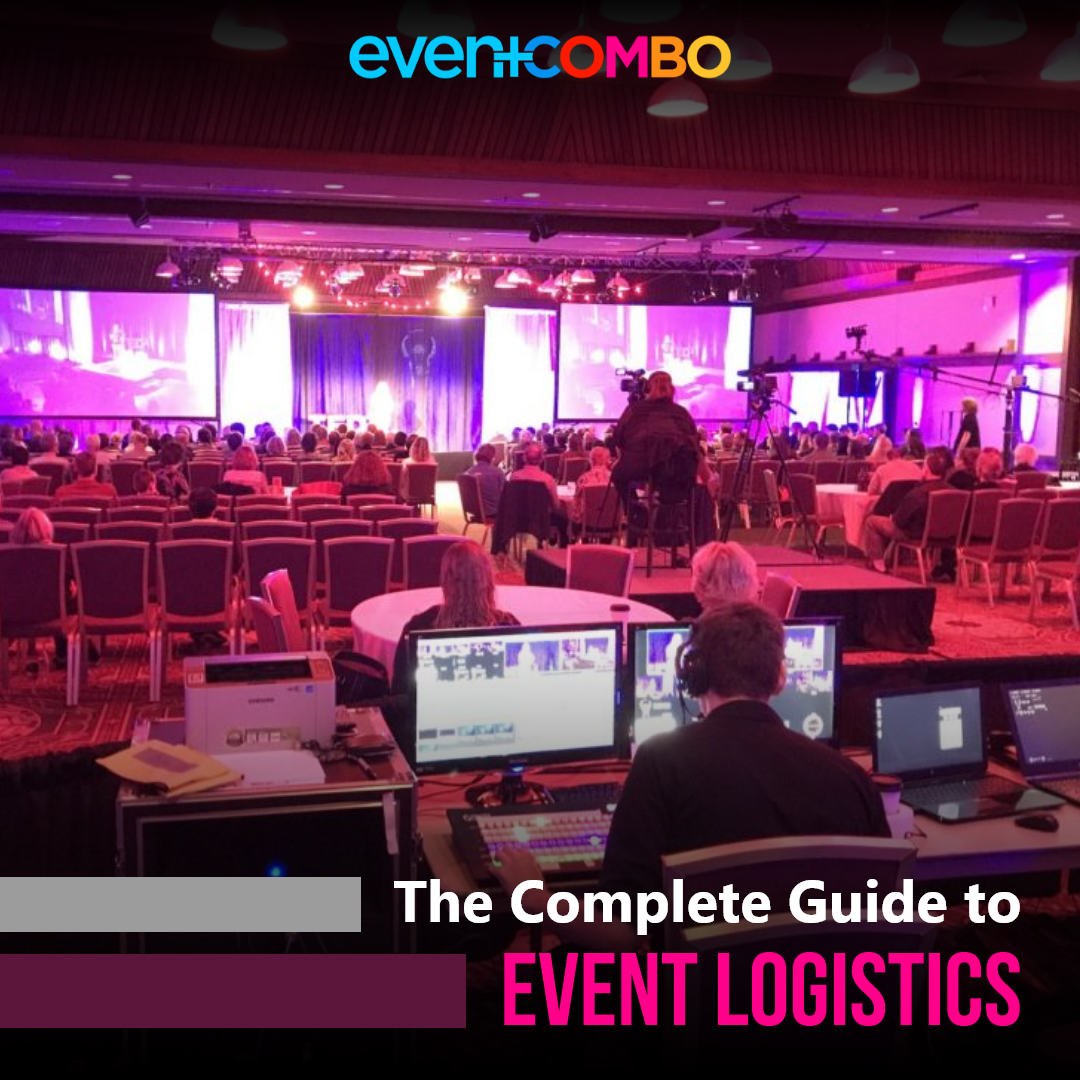

When we talk about planning an event where things go smoothly and everyone involved has a great experience, there are numerous pieces that need to be put together, starting all the way from conceptualization to post-event engagement. Every phase of an event lifecycle requires a lot of strategizing, but there is one specific area which requires a heightened focus on physical tasks and meticulous planning.
Among the many different processes and elements in event management, there's a hidden layer which is kind of like a secret backstage area for the event itself. This larger, behind-the-scenes process is known as event logistics.
In-person events have made a comeback with a lot of enthusiasm, and people's expectations for what they'll experience have gotten higher. Making arrangements for accommodations, transportation, distributing merchandise, setting up registration desks, and countless other tasks all contribute to creating a memorable experience for attendees. Just imagine if the venue wasn't fully prepared or the equipment needed for the event arrived late, causing chaos at the entrance. That wouldn't leave a good impression, right?
Event logistics is much more complicated than just making sure the keynote speaker gets to the venue, or organizing materials for a trade show, or setting up tables for the caterer. Alongside all the other planning activities, there are equally important logistical tasks happening in parallel to ensure that everything at the event location is
And by everything, we mean everything.
What is Event Logistics Management?
To make sure everything runs smoothly, and all the necessary elements come together, it's crucial to have a sharp focus on every detail of an event from beginning to end. Event logistics management involves both tangible and intangible components that ensure events are executed seamlessly with technical and logistical support services.
Think of event logistics as a key and independent part of an event. It steps in at various stages of event planning to coordinate all the processes and help drive the event toward success!
A typical event logistics plan includes managing the flow of attendees, organizing storage, handling event materials, arranging transportation for attendees, ensuring timely delivery of equipment, and planning the entrance points for the E-day (or days!). And these are just some of the important aspects of the whole picture.
Why Event Logistics Managers Should Follow the Event Lifecycle?
Event logistics management is a big task, and it's helpful for event planners to break it down into different stages of the event lifecycle. Splitting the event logistics plan into pre-event, during-event, and post-event segments allows for smoother integration with the overall event planning. Now, let's explore why it's important to organize the logistical services plan according to the different phases of the event and simplify event logistics.
Components of Event Logistics
Honestly, every event process relies on logistics services, and it's challenging to narrow it down to just a few. To ensure everything gets to the venue or from location A to B within the venue, you can either hire an agency or develop an in-house team. We recommend using professional services, who will act as your event planning logistics guide until your team becomes familiar with all the details. Then, you can gradually transition to an in-house logistics planning team.

Let's start by discussing the most important elements that form the foundation of any event logistics plan.
1. Venue - Securing a venue with a "wow" factor is the initial choice for every event planner. However, not all venue options are feasible due to factors like cost, accessibility from major airports, availability of auxiliary service providers, and more. Above all, the venue should add value to the event goal and ROI. The logistics department considers other factors too, such as accommodating estimated attendance without any hassle and comparing in-house services offered by the venue with the cost of outsourcing those services.
2. Catering - Sustainability in events is becoming a priority for event planners and they are getting conscious and creative with food options. Mealtime acts as a networking booster, so planning a menu that appeals to attendees and keeps their spirits high is crucial. A truly effective event logistics plan must consider sustainability, balance energy, and fuel costs, minimize waste (post-event cleanup can be challenging), stay within budget, and ensure easy procurement without the need for unusual equipment. It's also important to compare the catering options offered by the venue with your desired menu.
3. Transportation - Managing transportation is a crucial task for the logistics department, requiring precise time coordination while keeping costs in check. There are attendees who require transport as well as other materials and assets to be delivered for the event.
4. Merchandise and Physical Items - Merchandise plays a small but scattered role at events. It includes prizes, giveaways, tokens, event swag, and other printable materials sourced from different vendors or teams. Event assets such as LED signages, whiteboards, and reusable items like name boards also fall under this category. In some cases, organizations participating in a trade show may ask you to receive deliveries on their behalf a day before the event. Managing event assets and merchandise involves receiving packages, forwarding them to storage, and distributing them at scheduled times.
This element of logistics also focuses on optimizing the transport, with flexibility and a greater chance of adapting to changes and unforeseen speed bumps.
5. Technology - Communication plays a crucial role in every logistical element, and to facilitate it, you need devices like walkie talkies and tablets. Laptops and internet servers are necessary to support event management software. Event technology is revolutionizing in-person events by automating tasks, simplifying attendee engagement, and creating an exciting event experience. Technological assets include AR/VR equipment, production and AV equipment such as cameras, mixers, and projectors, and much more. Additionally, self-help chatbot desks and software/hardware tools are required by speakers and guests.
Technology devices are expensive and require careful handling in facilities that offer a completely dust-free environment and secure internet connections.
Logistic management software is gaining popularity for its ability to streamline coordination with pre-designed templates, workflows, and task assignments, making it a sensible choice amidst the logistics frenzy.
How to Set the Stage on Fire With Logistics
Now that we have a deep insight into event logistics, here are some final takeaways on how to simplify event logistics plan for easier implementation at the very next event on your charts.
Site Outbound Logistics
The last leg of the logistics plan is making sure what came in goes out too. Clearing up the site after an event is basically etiquette, and you don’t want damages now when the event execution has been so awesome! Vendors’ patience runs out as the event ends. The hurry can again block exit passages, ultimately delaying the check-out process. Coordinate with vendors to schedule their departure times, preventing blockages and delays. Conduct a final site inspection with the venue manager to ensure a respectful handover.
Make sure you introspect your performance and quickly huddle with team members and vendors to discuss things and gain insights for planning even better the next event.
Event logistics are basically entwined with every event process, and incorporating smart action plans, keen attention to detail, and great management skills, along with technical resources, can turn around your events every single time for the better!

The metrics look strong. Registrations are up. Attendance holds. Satisfaction scores clear the benchmark. Then comes the CFO question that freezes the room. Which registrations turned into customers? Sales checks the...

Professional certifications for event planners do more than provide a solid foundation in the field; they offer valuable exposure to the dynamic world of event planning and insights from prominent industry experts.

Choosing the right event management platform is vital for event professionals navigating the growing demand for in person , virtual, and hybrid events. Modern planners need solutions that offer robust features,...